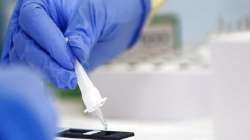Researchers develop new faster, cheaper COVID-19 test that uses pencil lead
The Low-cost Electrochemical Advanced Diagnostic (LEAD) test gives 100-per cent-accurate results from saliva samples and up to 88 per cent accuracy in nasal samples, the researchers said.

A new "cheaper, faster, and more accurate" COVID-19 diagnostic test that uses electrodes made from graphite -- the material found in pencil lead - to detect the SARS-CoV-2 virus has been developed by researchers in the United States.
A team at the University of Pennsylvania in the US noted that current COVID-19 tests are limited by the tradeoff between accuracy and the time it takes to analyse a sample.
Another challenge of current COVID-19 tests is cost as most tests are expensive to produce and require trained personnel to administer and analyse them, they said.
According to the research published in the journal PNAS, the graphite electrodes in the new test reduce the cost to USD 1.50 per test and require only 6.5 minutes to deliver the results.
The Low-cost Electrochemical Advanced Diagnostic (LEAD) test gives 100-per cent-accurate results from saliva samples and up to 88 per cent accuracy in nasal samples, the researchers said.
The test uses easily assembled materials such as human angiotensin-converting enzyme 2, modified graphite leads, and a plastic vial.
In the test, the electrodes bind to the samples and a chemical signal is displayed. The height of the peak of the signal indicates whether the sample is negative or positive.
Previously the research team worked on a COVID-19 testing kit called RAPID which uses screen-printed electrodes. The new research uses the same concept as RAPID but with less expensive materials.
"LEAD is easier to assemble, it can be used by anyone and the materials are cheaper and more accessible than those of RAPID," said Cesar de la Fuente, an assistant professor at University of Pennsylvania.
"This is important because we are using an abundant material, graphite, the same graphite used in pencils, to build the electrode to make testing more accessible to lower-income communities," de la Fuente said.
The researchers noted that LEAD's functionalisation and sample diagnosis take less than a few hours and can be made for a fraction of some of the most inexpensive tests on the market.
"Currently, we are working to improve the technology and stability of our tests," said de la Fuente.
"We will always be looking for ways to make the most effective version of LEAD, but we are also working to find industry partners and conduct more clinical studies to push the use of LEAD for COVID testing as soon as possible," he said.
While COVID-19 is the top priority, the test can also detect other transmissible diseases, keeping this research relevant in the future, the researchers added.
(With PTI Inputs)
ALSO READ | Novavax seeks OK for COVID vaccine in needy countries first
ALSO READ | COVID-19 Delta variant produces similar viral loads in vaccinated, unvaccinated: Study